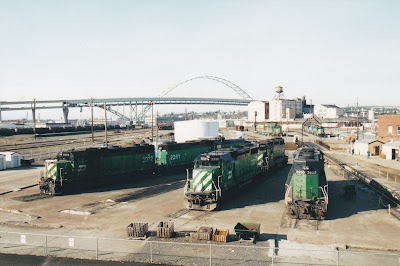In the spring of 1994, my dad and I went railfanning in Portland, Oregon, with Fred Anderson. our first stop was Union Pacific's Albina Yard, where I photographed some Union Pacific bay-window cabooses.
The two red cabooses on the left are former Missouri Pacific cabooses. Missouri Pacific had 401 of these compact-body bay-window cabooses built between 1976 and 1982. All of them were transferred to the Union Pacific when it took over the Missouri Pacific in 1982. These cabooses were used all over the Union Pacific system without being repainted in Union Pacific colors.
The next caboose is a CA-13 class bay-window caboose. It was originally built for the Chicago, Rock Island & Pacific Railroad. In 1963, the Union Pacific and the Rock Island planned to merge, but objections from other railroads led to the Interstate Commerce Commission holding a prolonged series of hearings, and by the time the merger was finally approved in 1974, the Rock Island's deteriorating financial situation and the conditions imposed by the ICC led Union Pacific to withdraw its merger application. In the meantime, however, Union Pacific had purchased locomotives, freight cars, and cabooses for lease to the Rock Island. After declaring bankruptcy in 1975, the Rock Island shut down in 1980, and all of this equipment was returned to Union Pacific, including 127 bay-window cabooses built between 1967 and 1971 (there were originally 130 cabooses, but three were wrecked). Union Pacific added these cabooses to its own fleet, and 36 of them were rebuilt and repainted into Union Pacific colors before an economic recession and changing laws began reducing the need for cabooses.
The caboose on the far right is a CA-11 class bay-window caboose. Union Pacific purchased 100 of these compact-body bay-window cabooses from the International Car Company of Kenton, Ohio, in 1979, after borrowing and studying one of Missouri Pacific's new compact-body bay-window cabooses. Though similar, Union Pacific's design features a longer carbody.
Leading a group of Southern Pacific diesels, Southern Pacific #7613 is a 3,000-horsepower GP40-2 that was built by the Electro-Motive Division of General Motors in March 1978. It had been repainted with the new "Speed Lettering" that was introduced in 1991.
 |
| Photo by Fred Anderson |
Here is Fred Anderson's photograph of Southern Pacific GP40-2 #7613.
Here is another picture I took of Southern Pacific GP40-2 #7613.
A Union Pacific freight train arrived at Albina Yard, pulled by a pair of Union Pacific SD40-2s.
Leading the train is Union Pacific #3728, a 3,000-horsepower SD40-2 that was built by the Electro-Motive Division of General Motors in February 1980.
 |
| Photo by Fred Anderson |
Here is Fred Anderson's photograph of Union Pacific SD40-2 #3728.
The trailing locomotive was Union Pacific #3342, a 3,000-horsepower SD40-2 that was built by the Electro-Motive Division of General Motors in February 1977.
We were on our way out of Albina when we saw another Union Pacific freight train waiting to enter the yard, so we stopped to photograph it, as Fred Anderson can be seen doing here.
 |
| Photo by Fred Anderson |
Here is Fred Anderson's photograph.
Union Pacific #6257 is a 3,800-horsepower SD60M that was built by the General Motors Locomotive Group in London, Ontario, in November 1990.
After one last photograph of Union Pacific SD60M #6257, we headed across the Willamette River to Burlington Northern's Hoyt Street Yard.
Burlington Northern #7049 is a 3,000-horsepower SD40-2 that was built by the Electro-Motive Division of General Motors in April 1978.
GATX Capital Corporation #7350 is a 3,000-horsepower SD40-2 that was originally built by the Electro-Motive Division of General Motors in June 1974 as Milwaukee Road #183. After the Milwaukee Road was merged into the Soo Line on January 1, 1986, it became Soo Line #6350. It later became part of the GATX Capital Corporation lease fleet as #6350, and was later renumbered to #9350, before becoming #7350 as seen here. I think it actually had GSCX reporting marks at this point, though it was still owned by GATX Capital Corporation.
This overview of the engine terminal of Burlington Northern's Hoyt Street Yard was taken from a staircase leading up to the Lovejoy Street Viaduct. Several Burlington Northern diesel locomotives rest on the garden tracks where the roundhouse once stood.
Burlington Northern #2072 is a 2,000-horsepower GP38 that was built by the Electro-Motive Division of General Motors in February 1970. It was originally ordered as Spokane, Portland & Seattle #200, but the Burlington Northern merger intervened, and it was delivered as the new railroad's first new locomotive.
Burlington Northern #2261 is a 2,000-horsepower GP38-2 that was built by the Electro-Motive Division of General Motors in June 1973 as St. Louis-San Francisco (SLSF, also known as the Frisco) #406. The Frisco was merged into the Burlington Northern in 1980.
Burlington Northern #2187 is a 2,000-horsepower GP38 that was built by the Electro-Motive Division of General Motors in May 1970 as Penn Central #7685 and became Conrail #7685 in 1976. Burlington Northern purchased it from Conrail in July 1985, and reclassified it as a GP38X.
Burlington Northern #2731 is a 2,300-horsepower GP39-2 that was built by the Electro-Motive Division of General Motors in April 1981.
Burlington Northern #3550 was built by the Electro-Motive Division of General Motors in December 1966 as 3,000-horsepower GP40 Chicago, Burlington & Quincy #172. It became Burlington Northern #3002. It was rebuilt by EMD in November 1989 as the first of six GP40Es.
 |
| Photo by Fred Anderson |
Finally, here is Fred Anderson's photograph of Burlington Northern's Hoyt Street Yard.













No comments:
Post a Comment